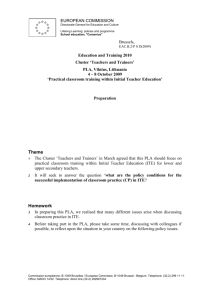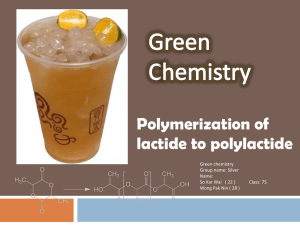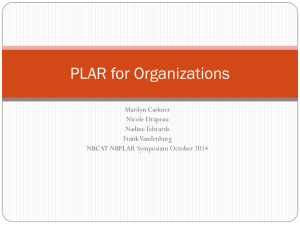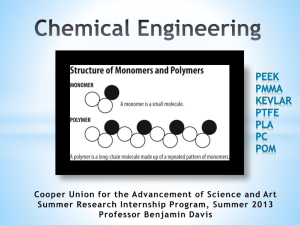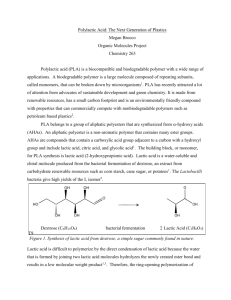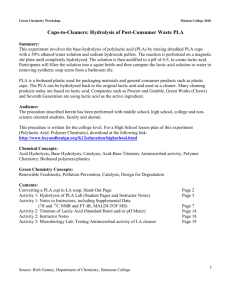Synthesis of Biodegradable Polylactic Acid from Lactic Acid
advertisement
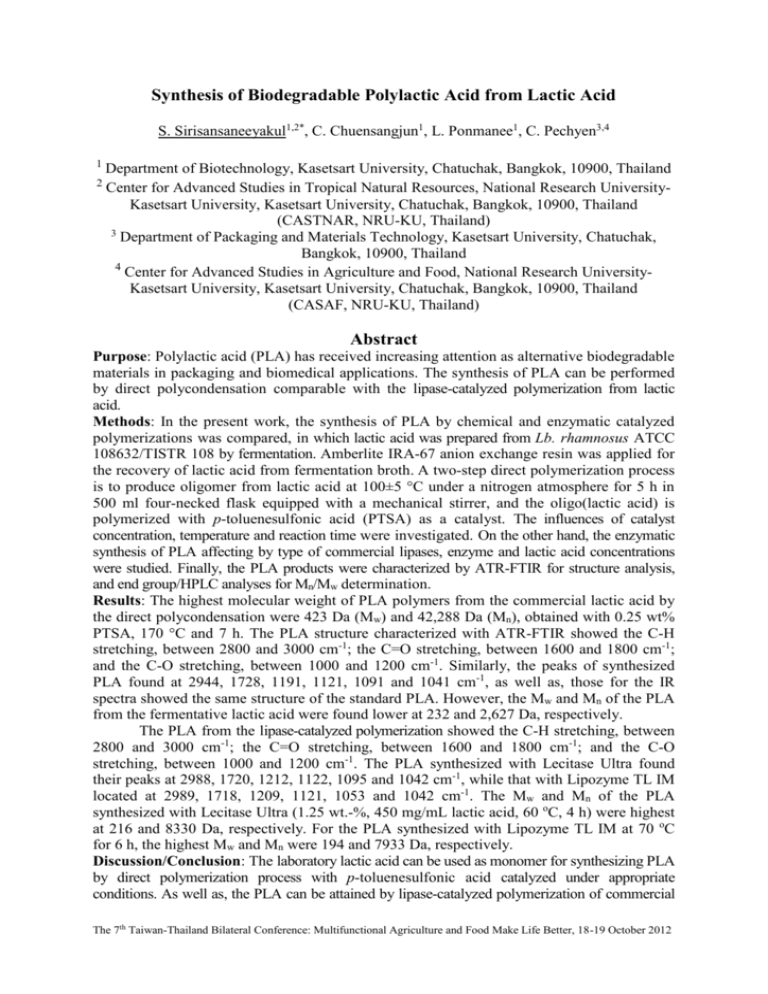
Synthesis of Biodegradable Polylactic Acid from Lactic Acid S. Sirisansaneeyakul1,2*, C. Chuensangjun1, L. Ponmanee1, C. Pechyen3,4 1 2 Department of Biotechnology, Kasetsart University, Chatuchak, Bangkok, 10900, Thailand Center for Advanced Studies in Tropical Natural Resources, National Research UniversityKasetsart University, Kasetsart University, Chatuchak, Bangkok, 10900, Thailand (CASTNAR, NRU-KU, Thailand) 3 Department of Packaging and Materials Technology, Kasetsart University, Chatuchak, Bangkok, 10900, Thailand 4 Center for Advanced Studies in Agriculture and Food, National Research UniversityKasetsart University, Kasetsart University, Chatuchak, Bangkok, 10900, Thailand (CASAF, NRU-KU, Thailand) Abstract Purpose: Polylactic acid (PLA) has received increasing attention as alternative biodegradable materials in packaging and biomedical applications. The synthesis of PLA can be performed by direct polycondensation comparable with the lipase-catalyzed polymerization from lactic acid. Methods: In the present work, the synthesis of PLA by chemical and enzymatic catalyzed polymerizations was compared, in which lactic acid was prepared from Lb. rhamnosus ATCC 108632/TISTR 108 by fermentation. Amberlite IRA-67 anion exchange resin was applied for the recovery of lactic acid from fermentation broth. A two-step direct polymerization process is to produce oligomer from lactic acid at 100±5 °C under a nitrogen atmosphere for 5 h in 500 ml four-necked flask equipped with a mechanical stirrer, and the oligo(lactic acid) is polymerized with p-toluenesulfonic acid (PTSA) as a catalyst. The influences of catalyst concentration, temperature and reaction time were investigated. On the other hand, the enzymatic synthesis of PLA affecting by type of commercial lipases, enzyme and lactic acid concentrations were studied. Finally, the PLA products were characterized by ATR-FTIR for structure analysis, and end group/HPLC analyses for Mn/Mw determination. Results: The highest molecular weight of PLA polymers from the commercial lactic acid by the direct polycondensation were 423 Da (Mw) and 42,288 Da (Mn), obtained with 0.25 wt% PTSA, 170 °C and 7 h. The PLA structure characterized with ATR-FTIR showed the C-H stretching, between 2800 and 3000 cm-1; the C=O stretching, between 1600 and 1800 cm-1; and the C-O stretching, between 1000 and 1200 cm-1. Similarly, the peaks of synthesized PLA found at 2944, 1728, 1191, 1121, 1091 and 1041 cm-1, as well as, those for the IR spectra showed the same structure of the standard PLA. However, the Mw and Mn of the PLA from the fermentative lactic acid were found lower at 232 and 2,627 Da, respectively. The PLA from the lipase-catalyzed polymerization showed the C-H stretching, between 2800 and 3000 cm-1; the C=O stretching, between 1600 and 1800 cm-1; and the C-O stretching, between 1000 and 1200 cm-1. The PLA synthesized with Lecitase Ultra found their peaks at 2988, 1720, 1212, 1122, 1095 and 1042 cm-1, while that with Lipozyme TL IM located at 2989, 1718, 1209, 1121, 1053 and 1042 cm-1. The Mw and Mn of the PLA synthesized with Lecitase Ultra (1.25 wt.-%, 450 mg/mL lactic acid, 60 oC, 4 h) were highest at 216 and 8330 Da, respectively. For the PLA synthesized with Lipozyme TL IM at 70 oC for 6 h, the highest Mw and Mn were 194 and 7933 Da, respectively. Discussion/Conclusion: The laboratory lactic acid can be used as monomer for synthesizing PLA by direct polymerization process with p-toluenesulfonic acid catalyzed under appropriate conditions. As well as, the PLA can be attained by lipase-catalyzed polymerization of commercial The 7th Taiwan-Thailand Bilateral Conference: Multifunctional Agriculture and Food Make Life Better, 18-19 October 2012 and laboratory lactic acids. The molecular weight of the lipase-catalyzed PLA is lower than that from the chemical-catalyzed polymerization; however, an improvement of the former is an alternative tool for the production of bioplastics of the new green biomaterials. Keywords: polylactic acid, lactic acid, direct polymerization, chemical-catalyzed polymerization polymerization, lipase-catalyzed *Corresponding author. 50 Ngamwongwan Road, Chatuchak, Bangkok 10900, Thailand, Tel. 66 02 5625086, Fax 66 02 5794096, and E-mail: sarote.s@ku.ac.th The 7th Taiwan-Thailand Bilateral Conference: Multifunctional Agriculture and Food Make Life Better, 18-19 October 2012
